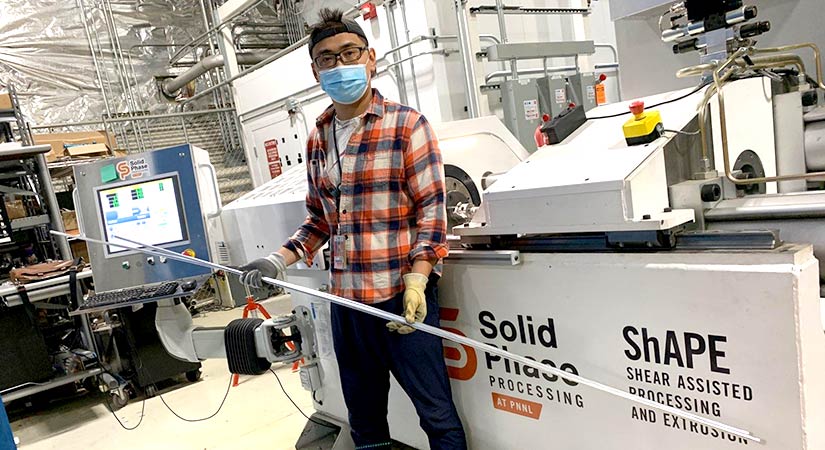ShAPE: Shear-Assisted Processing and Extrusion
NREL supports Pacific Northwest National Laboratory's Shear-Assisted Processing and Extrusion (ShAPE™) project by providing detailed techno-economic analysis and manufacturing analysis to better understand the cost and energy reduction potential of ShAPE manufacturing.

NREL provides Pacific Northwest National Laboratory with critical techno-economic analysis of ShAPE technology. Photo from Scott Whalen, PNNL
NREL conducted techno-economic analysis modeling and analysis to compare the ShAPE manufacturing process with conventional extrusion of high-performance aluminum alloys. This work was done in collaboration with Pacific Northwest National Laboratory (PNNL). ShAPE helps reduce manufacturing costs and makes higher-quality raw materials while significantly reducing their energy consumption, carbon emissions, and costs.
As part of the ShAPE technology research effort, researchers from NREL and PNNL analyzed the economic value of this new manufacturing process, focusing specifically on a promising high-strength, low-weight metal: aluminum alloy 7075 (an alloy made with about 90% aluminum, 6% zinc, and a few additional metals). Access the results of this analysis via the technical report Techno-Economic Analysis for Shear Assisted Processing and Extrusion (ShAPE) of High-Strength Aluminum Alloys.
The ShAPE technology, which was patented by PNNL, is an innovative advanced manufacturing process that received a 2020 R&D 100 Award in the Processing/Prototyping category. ShAPE uses solid-phase processing to produce rods and tubes directly from high-performance aluminum alloy billets or powders. Solid-phase processing uses high-speed shearing rather than melting the material, allowing the microproperties to be enhanced as the part is being extruded. NREL supported this work by comprehensively examining the manufacturing costs, factoring in not only the innovative process, but the computing materials, labor, electricity, equipment, and facility costs associated with each manufacturing step.
Impact
By employing clean energy manufacturing analysis modeling to compare the typical extrusion process of aluminum alloy billets and powders with the ShAPE manufacturing process, NREL helped inform PNNL with insights related to the cost potential of producing high-performance parts with reduced energy, and potential research and development paths for this new technology.
Capabilities
NREL offers a variety of techno-economic capabilities for advanced manufacturing, including:
Solar technology cost analysis.
Publications
Techno-Economic Analysis for Shear Assisted Processing and Extrusion (ShAPE) of High-Strength Aluminum Alloys, NREL Technical Report (2022)
Novel Manufacturing Method Could Reduce Costs, Time, and Energy Needed To Make High-Quality Metals, NREL Fact Sheet (2022)
Partners
Contact
Share
Last Updated Feb. 10, 2025
